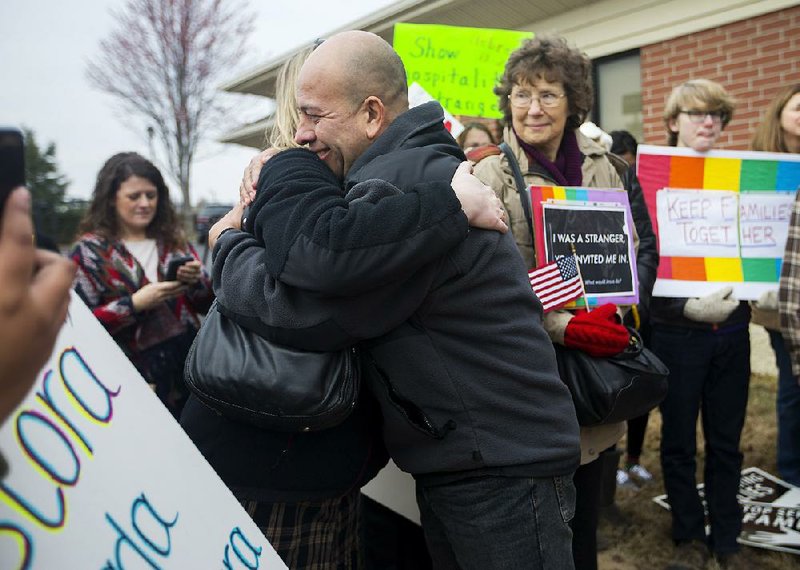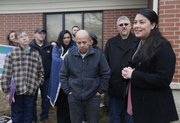FAYETTEVILLE -- A Hispanic pastor and her husband will learn within days whether they'll receive another one-year reprieve from deportation, their attorney said moments after the couple anxiously met with immigration authorities.
Amanda and Jose Aristondo, Guatemalan citizens who have lived illegally in Arkansas since 2001 after overstaying a tourist visa, had braced to be immediately detained and quickly deported ahead of their Tuesday check-in with U.S. Immigration and Customs Enforcement.
Such an outcome, which their attorney previously said was the "most likely" result, would separate them from their two college-aged daughters, one of whom has a rare form of cancer, and leave a void in the Bentonville community where Amanda pastors dozens of Spanish-speaking congregants, said church members and friends.
Instead, they were released while their pending request to postpone deportation is decided, though their future in the country remains uncertain. When they exited the unmarked federal building, a crowd of about 30 family members, friends, congregants and other observers applauded.
[U.S. immigration: Data visualization of selectedimmigration statistics, U.S. border map]
"Hopefully, if we have luck, they'll approve [the one-year deportation break]," said Nathan Bogart, the couple's Fayetteville-based attorney. "If not, they're going to give us another check-in date -- sometime in the future, I don't know when -- and we'll get to do this over again."
For years, the Aristondos were shielded from immediate deportation by a series of one-year stays of deportation, Bogart said. Tuesday's check-in followed the Aristondos' first denial of a stay and coincided with nationwide reports of people who were not previously considered enforcement priorities being detained or deported after similar meetings.
Among the cases that diverged from enforcement norms was the January arrest of 18-year-old Tatiana Jaco-Alvarez of Searcy, who came to the U.S. as an unaccompanied migrant child and has a pending claim for asylum.
Jaco-Alvarez was detained during a Little Rock check-in and jailed in Louisiana for a week before being released on bond. Immigration authorities will not take further action against her until her claim is decided, a spokesman said.
Despite anxiety elsewhere, Amanda Aristondo said she was not surprised that she and her husband were allowed to leave the immigration office.
"I believe [in] what this country is about," Aristondo, 40, said. "You hear 'criminals are deported,' so you don't anticipate that happening to you, when you are doing it the right way, to make the community better. That's what we have been doing the whole time. Since we got here that first day, we started doing that, so you never expect that. Never."
Immigration and Customs Enforcement spokesman Tom Byrd, who was not authorized to speak specifically about the Aristondos' case, said the request for a stay will go to the agency's New Orleans field office because it originated in Fayetteville. The field office's director has the discretion to grant stays or deny them, Byrd said.
The Aristondos arrived to the United States in 2001 on a tourist visa and have never left. They chose Arkansas because the state is home to most of Amanda's family, many of whom have legal residency status or are citizens. Few close relatives remain in Guatemala, a Central American country suffering from high rates of violence and gang participation.
"This is a better place to raise [our daughters] and to pursue their dreams and to have better opportunities," Amanda Aristondo said. "The safety that we have in the United States is not the case in our country. Here you can go wherever you want in the middle of the night if you need something. You go, and you are safe. That's not the case in my country. When you go out, you are looking around all of the time. That feeling, I didn't want that for my girls."
Their daughters both attend Arkansas universities. Because they arrived as children, they applied for and received deferred-removal status through a federal program President Barack Obama's administration implemented in 2012. The status means they are not presently priorities for immigration enforcement and grants them work permits.
The family in 2008 filed an asylum claim, which a Memphis-based immigration judge denied, after Immigration and Customs Enforcement placed the couple in removal proceedings, Bogart said. After exhausting their appeals, the pair received a removal order.
Since then, Immigration and Customs Enforcement early each year approved one-year stays of removal, which protected the Aristondos from immediate deportation. That changed early this year when their request for a stay was denied, Bogart said. A Miami-based attorney, who could not be reached for comment Tuesday, handled their case until recently, Bogart said.
Bogart said it's hard to say "for certain" that the denial was related to President Donald Trump's executive orders that crack down on illegal immigration but that it appears to be the case.
"Those [U.S. Department of Homeland Security] memos [explaining new policy] made it clear that anybody with a final order of removal is now a priority," Bogart said. "It makes it seem like it's an instruction not to approve stays anymore. It doesn't specifically say that ... [but] any attempt to slow down that deportation is going to be viewed as hostile.
"You can draw your own conclusions from there."
Bogart, who took on the Aristondos' case weeks ago, said he would review the couple's pre-existing asylum claim and appeals to see if there are other legal measures he can take to help them stay in the country.
Amanda Aristondo has obtained the equivalency of a high school diploma and is taking classes toward a bachelor's degree in pastoral ministry, Bogart said. Both of her daughters played collegiate soccer. One is studying kinesiology and the other is a pre-med student, Amanda Aristondo said.
The eldest daughter in 2015 was diagnosed with a rare form of cancer. She recently entered remission but is still receiving treatment from St. Jude Children's Research Center in Memphis. The family moved to Memphis for the girl's treatment, but Amanda said she commuted weekly to Bentonville Church of the Nazarene, where she ministers to between 45 and 60 congregants a week.
The roughly 30 people who showed up to the immigrant office to support the Aristondos held signs, posed for photographs and prayed in the office's parking lot. Officials did not ask the crowd to leave the property or otherwise address them.
"We're asking for a miracle," Lauren Snodgrass, 36, said during the group's prayer.
Snodgrass and Stephanie Red, 35, members of Church of the Nazarene, said Amanda Aristondo's ministry goes beyond the physical church building. Among other charitable causes, she is active in community efforts to feed the hungry and provide clothes to the needy, they said.
Nelia Sandoval, a friend of Amanda's, said she often leans on Aristondo for guidance and leadership.
"Maybe she came to pursue the American dream, but now she's helping people live that," Sandoval, 34, said. "She helps so many people."
A Section on 03/15/2017

